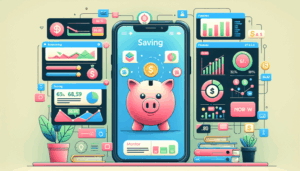
Having a healthy financial mindset is the starting point for achieving stability, success and peace of mind in your finances.
More than just dealing with numbers, it's about developing a balanced way of working. thinking, acting and relating to money on a daily basis.
A financial mindset is the set of beliefs, values and attitudes that influence the way a person makes decisions related to money.
It directly affects save, invest and spend wisely, This has an impact on financial life in the short and long term.
Having a healthy mindset means understanding that money is a tool and not a problem. It means using resources consciously, without guilt or impulsiveness.
The first step in developing a healthy financial mindset is to identify your current beliefs about money.
We often carry limiting ideas, such as:
“I'll never be able to save any money.”
“Rich is lucky.”
“Investing is too risky.”
These beliefs can sabotage financial progress. Recognizing them is essential to replacing them with more productive and realistic thoughts.
Replacing negative beliefs with positive ones is a process of mental and emotional re-education.
This can include studying about personal finance, You can also follow experts in the field and apply small habits on a daily basis.
Some empowering beliefs include:
I can managing my finances responsibly.
I can live well within my means.
Debt is not destiny, it's a choice I can avoid or control.
The change in mentality starts with the way you see your financial possibilities.
Building a solid mentality it doesn't happen overnight. It requires constancy, discipline and continuous learning. Here are some effective strategies:
Have specific goals, such as paying off debts, building up an emergency reserve or investing for the future.
Well-defined goals give direction and purpose to their financial actions.
The more knowledge you acquire, the easier it becomes to make the right decisions. Read books, follow blogs and attend courses on the subject.
Draw up a monthly budget with all your income and expenditure. This helps you identify waste and find opportunities for savings.
Transform saving into an automatic habit. Even small amounts saved regularly make a difference in the long run.
In addition to strategies, adopting hábitos financeiros saudáveis is essential for maintaining discipline and balance. Check out some practical examples:
Find out exactly where every dollar goes. List fixed and variable expenses and monitor them on a monthly basis. This allows you to make more informed decisions and avoid surprises.
Set up automatic salary transfers to a savings or investment account. This way, you prioritizes savings before consumption.
Follow podcasts, blogs and online courses about personal finance. The more you learn, the more confident you become about investing and planning for the future.
Avoid taking on unnecessary debt and keep your credit under control. Poorly managed debts are the enemy of positive financial mindset.
The way you facing and dealing with money is decisive for your financial success.
One positive financial mindset encourages a focus on solutions, learning and constant growth.
“A mind that is open to a new idea will never return to its original size.”
- Albert Einstein
Having a prosperous mindset means being resilient in the face of challenges, plan wisely e act with financial awareness.
Invest in financial education: Learn from the basics to more advanced strategies.
Set concrete financial goals: Have clear objectives to direct your efforts.
Take financial responsibility: Living within one's means and taking care of the future is an act of maturity.
With the right financial mindset, it is possible to build prosperity consistently.
Change begins when you believe in their ability to control their own money - and act accordingly.
Developing a healthy financial mindset is more than a choice - it's a commitment to your personal growth and emotional stability.
With knowledge, discipline and new attitudes, anyone can achieving balance and prosperity.
Start today by applying small changes and, little by little, you'll see a profound transformation in your relationship with money.
Here are some platforms and tools that can help you learn and organize your finances:
Mint: Budget and financial control application.
You Need A Budget (YNAB): Tool for personal financial planning.
Coursera: Free and paid courses on financial education.
NerdWallet: Tips on credit and debt management.